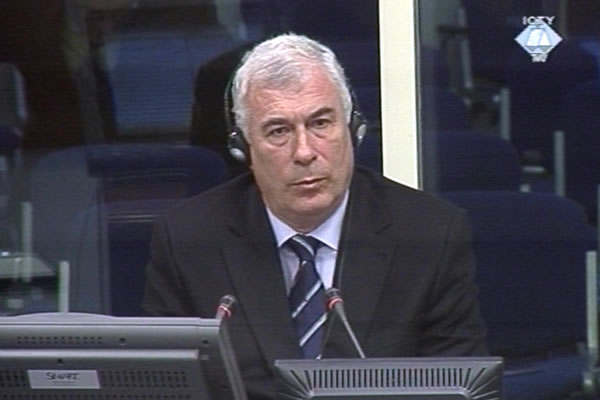Home
SERBS, CROATS AND BOSNIAKS ALL BECAME CROATS
Jure Radic, former Croatian minister for development and reconstruction, proposed to President Tudjman to limit the percentage of Serbs in a part of Croatia after Operation Storm to ‘no more than 10 percent’. Asked to clarify his proposal, Radic said that by Serbs he meant only those who attacked Croatia with guns, whereas, Croats for him were all loyal citizens regardless of their ethnic background: Serbs, Croats or Bosniaks alike. Radic was called to testify by the Trial Chamber
 Jure Radic, witness at the Ante Gotovina, Ivan Cermak and Mladen Markac trial
Jure Radic, witness at the Ante Gotovina, Ivan Cermak and Mladen Markac trial The first of the seven witnesses of the Trial Chamber at the trial of generals Gotovina, Cermak and Markac is Jure Radic, former Croatian deputy prime minister and minister of development and reconstruction. Today the judges questioned Radic about the intent of the Croatian authorities to permanently expel Serbs from Krajina in August 1995. As alleged in the indictment, their permanent elimination was a goal of the joint criminal enterprise headed by President Tudjman and involving all three accused. The minutes taken at a number of government and Supreme Defense Council meetings in 1995 and 1996 - admitted into evidence during the prosecution and defense cases – listed the witness’s name among the attendees. Radic often intervened in the discussions.
At the meeting of the state leadership on 17 December 1996 attended by Radic, Tudjman asked that the Serb refugee be ‘offered a monetary compensation for not returning to their homes’. Radic tried to ‘clarify’ the president’s words, saying that there was a lot of debate going on at the time: various options were tabled, but ‘eventually’ Radic was able to convince Tudjman that it was better to offer the Serbs first the opportunity to return and then a compensation to those who didn’t want to come back.
However, as presiding judge Alphons Orie noted, at the same meeting Radic tried to convince Tudjman that Serbs were ‘the most corrupt nation in the world’. The Croatian state ‘could do much by buying out their property’. When the judge remarked that his words didn’t imply that he favored the return of the Serbs, the witness said that he was not sure which solution was the best at the time.
The court focused on the minutes from the meeting on 11 August 1995, where President Tudjman suggested a ‘radical measure’: confiscate the property of those Serbs who failed to return to Croatia within one month. Radic said he never saw this proposal as negative, but as an ‘incentive’ for the refugees to come back as soon as possible. However, it was difficult for the refugees to return for various reasons, and the Croatian authorities extended the deadline to three months, the witness explained. The deadline was later repealed. Judge Orie went on to note that the Trial Chamber has already heard – in particular in the evidence of former US ambassador in Zagreb Peter Galbraith – that the plan to confiscate the abandoned property was abandoned because of international pressure. Radic admitted that some ambassadors ‘suggested’ that Serbs should return as soon as possible.
Finally a transcript of a meeting of the Croatian leadership on 22 August 1995 was shown, where Radic suggests that the number of Serbs in the strategically important areas along the Karlovac-Slunj-Ogulin line should be limited to ‘no more than 10 percent’. This prompted President Tudjman to say, ‘Less than 10 percent!’. Radic tried to convince the judges that things were not what they seemed. The idea was not to prevent the Serb refugees from returning, but to settle Croats, so as to bring their number to ten times as many as the Serbs. Since he claimed that the goal of the government was to settle the people in an uninhabited area to protect Croatia’s strategic interests, the presiding judge asked Radic why then he brought up their ethnic background in the first place. ‘When I say Serbs, I mean those who attacked Croatia with guns, and when I say Croats I mean our citizens regardless of their ethnic background: Serbs, Croats, Bosniaks or whoever,’ Radic replied.
Before the former Croatian minister of development and reconstruction took the stand, the court was told that on 25 May 2009 he had given a statement to Ante Gotovina’s defense. It was not disclosed why Gotovina’s defense decided not to call Radic.
Jure Radic continues his evidence tomorrow.
Linked Reports
- Case : Gotovina et al. - "Operation Storm"
- 2010-02-18 KNIN EC MONITORS’ LOGBOOK NOT IN EU ARCHIVES
- 2010-02-05 TRIAL CHAMBER: ‘EU SHOULD DELIVER A MORE DETAILED REPORT’
- 2010-01-27 THE TRIAL CHAMBER CALLS WITNESSES AT THE OPERATION STORM TRIAL
- 2010-02-25 ‘TO CROATIZE’ IS TO ‘EUROPEANIZE’
- 2010-02-26 MINES THAT KILL ONLY SERBS
- 2010-03-04 ‘MYSTERY’ OF KISTANJE
